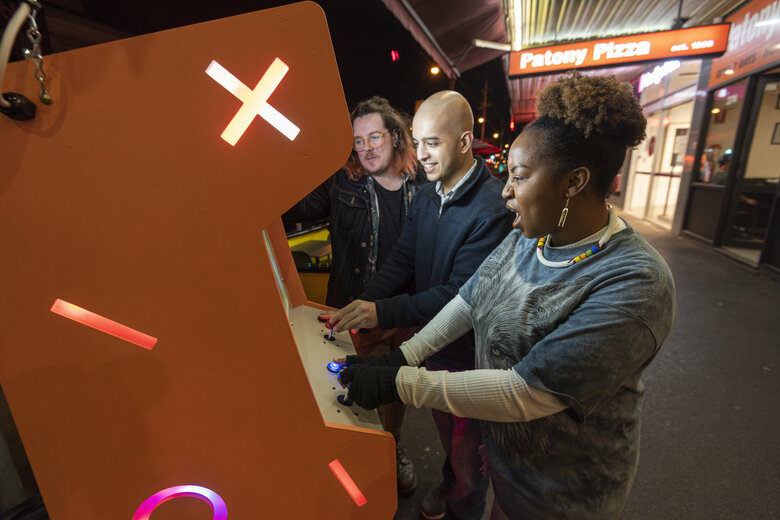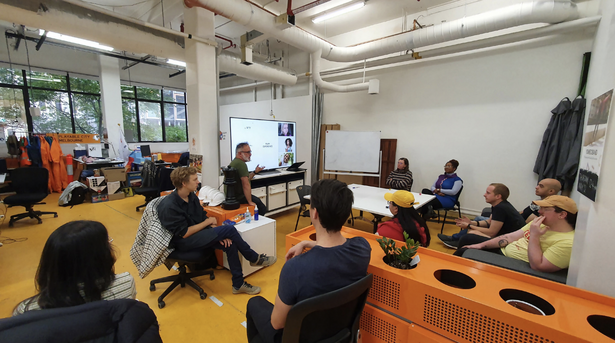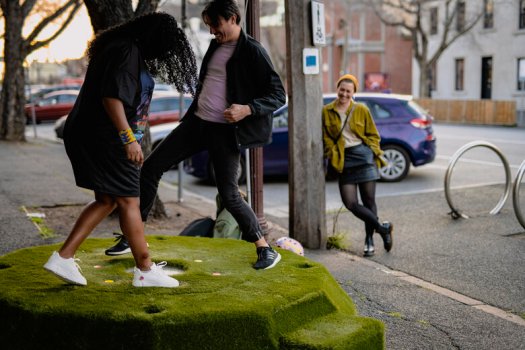
City of Port Phillip is one of 31 LGAs in the Greater Melbourne metropolitan area and home to a diverse population of over 112,000 people.

It’s also a hub for digital games, animation, and interactive media development, making it ideal for a unique project that saw one of its streets temporarily transformed into an outdoor games arcade.
The project had its origins earlier this year, when the City commissioned researchers from RMIT to design the Clarendon Street Arcade in south Melbourne.
“The proposal was to look at five different arcade games, from familiar to abstract and experimental and engage with the street in a positive way,” Troy Innocent from RMIT’s Future Play Lab told Government News.
“We wanted to get a mix of different cultural elements and look at how games could bring that together.”
A report on the project published earlier this month assessed its value as both an exercise in playful interventions in public spaces, and a case study for the benefits of urban play.
Authors Dr Innocent and colleagues Dale Leorke and Carlo Tolentino say the experiment showed that arcades can remain in a dense urban environment 24/7 over several months with regular maintenance and minimal security.
The project also helped re-engage the community with public spaces after Covid, as well as giving local traders a much-needed boost.

“We found that apart from incidences of vandalism and some weather effects, they really held up quite well,” Dr Innocent said.
“Positive feedback was that businesses were really super engaged, and anecdotal evidence from the businesses we engaged with … was that there was a lot of play, and people were stopping and having increased dwell time on the street.”
Custom made
The arcade consisted of five custom-made cabinets loaded with games inspired by Melbourne’s geography, culture, city life and indigenous history.
Designed with input from local gamemakers, musicians and artists, they included an interactive jukebox, an emoji game and a virtual hole in the ground.
The cabinet remained onsite for 13 weeks over July and October of this year, and were programed to be playable between 7am and 10pm.
City of Port Phillip Film and Industry Lead Richard Sowada said council learnt a lot from the arcade experience.
“The Clarendon Street Arcade project and our partnership with RMIT’s Future Play Lab provided a unique and exciting opportunity to support our local traders on Clarendon Street and a creative way to activate our outdoor spaces with free entertainment for residents and visitors,” he told Government News.
A major benefit of the project was that it supported Clarendon Street traders in their ongoing Covid-19 recovery efforts, Mr Sowada said.
It was a creative gift from smart people and just plain fun.
City of Port Phillip Film and Industry Lead Richard Sowada
“The arcade trail brought simple but high-quality ideas that anyone can participate in,” he said.
“For the community, the idea of an arcade adds that bit of surprise and random experience that isn’t trying to get anything from you aside from a reaction and interaction. It was a creative gift from smart people and just plain fun.”
Mr Sowada says Council is permanently looking for opportunities to consolidate Port Phillip as Victoria’s games capital as part of our Games Action Plan 2020-24.

“Our Games Action Plan is designed to build industries and careers in the sector,” Mr Sowada says.
“The games industry is massive, has an international reach and the skills it develops can be applied across art and entertainment, architecture and engineering, education and training and industry of all kinds.
“If we can highlight those surprising connections and opportunities even at this unexpected street level, then we can go some way in cultivating the base of an authentic sector with roots in Port Phillip.”
The Plan will continue to deliver a range of public gaming events and exhibits through the year, as well working with developers and providing the professional games sector with business-to-business opportunities, he says.
The benefits of urban play
Dr Innocent says by giving people permission to be themselves and play in public spaces, urban play flows through to urban design and the way local authorities think about these spaces.
“Post-pandemic, local government is really connecting economic activitation and creative place making much more closely than they were before,” he says.
“This is one of the positive impacts of the pandemic, that public spaces have become much more flexible and playful and experimental.
“And that’s really pushed a lot of local governments into these strategies of creative placemaking and willingness to experiment in their public spaces. “
*Read more here: Playful Parklets
Comment below to have your say on this story.
If you have a news story or tip-off, get in touch at editorial@governmentnews.com.au.
Sign up to the Government News newsletter